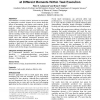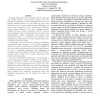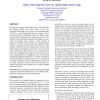70 search results - page 3 / 14 » Predicting task execution time on handheld devices using the... |
CHI
2004
ACM
14 years 7 months ago
2004
ACM
User attention is a scarce resource, and users are susceptible to interruption overload. Systems do not reason about the effects of interrupting a user during a task sequence. In ...
ISLPED
2004
ACM
14 years 25 days ago
2004
ACM
Mobile, battery-powered devices such as personal digital assistants and web-enabled mobile phones have successfully emerged as new access points to the world’s digital infrastru...
AIPS
2006
13 years 8 months ago
2006
We view dynamic scheduling as a sequential decision problem. Firstly, we introduce a generalized planning operator, the stochastic task model (STM), which predicts the effects of ...
IPPS
2005
IEEE
14 years 1 months ago
2005
IEEE
Enabling high performance, persistent mobile computing has recently become a very active research area. The widespread popularity of mobile computing devices, such as laptops, han...
CHI
2000
ACM
13 years 11 months ago
2000
ACM
We performed several experiments using a Personal Digital Assistant (PDA) as an input device in the nondominant hand along with a mouse in the dominant hand. A PDA is a small hand...



